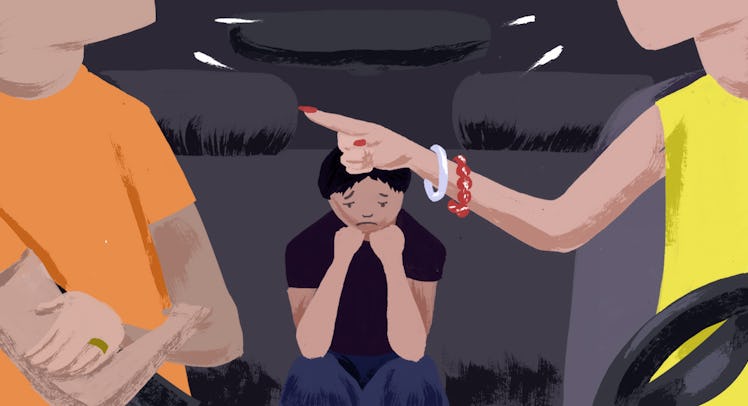How Road Rage Affects Kids
Even if you don't run that other guy off the road, losing your cool in front of your kids can cause long-term problems.

We’ve all been cut off in traffic or tailed too closely by another driver, gotten pissed, laid on our horn, and maybe dropped a few F-bombs. Some of us have even taken things further, riding the offending driver’s bumper in return or squeezing them out of a lane to see how they like it. These behaviors are all forms of aggressive driving bordering on road rage, and none of them are healthy. But even if you don’t run that other guy off the road, losing your cool in front of your kids can cause long-term problems.
“I call the back seat the ‘road rage nursery’,” Leon James, professor of psychology at the University of Hawaii and coauthor of Road Rage and Aggressive Driving: Steering Clear of Highway Warfare told Fatherly. “This cultural temper tantrum is transmitted from generation to generation, and it gets worse because people add their own novel ways of expressing it.”
Even when those reactions don’t involve physical violence, the simple fact that you’re angry while operating a motor vehicle put you, your passengers, and other drivers at risk. “When you’re behind the wheel, where there is a need for decorum, rationality, and calm, it is very dangerous to get angry and react,” Richard Joelson, a psychotherapist and social worker in New York told Fatherly.
But besides upping the odds of a car accident, your antics behind the wheel are the sort of thing your children internalize, to their psychological detriment. That’s because, according to James, most parents who express verbal road rage when their kids are not in the car do not simply become different people when the back seat is full — they rant and rave right in front of their children. “To the extent that every parent is a role model, watching a parent express road rage is a nightmare,” Joelson says. “It is very frightening for the child and often so humiliating that their regard for that parent diminishes, which is very costly to both parent and child. Any child who is embarrassed or apologetic of dad or mom is suffering.”
On top of that, you’re teaching your kids the wrong way to deal with aggravating situations. “The parent’s emotional response gets generalized to any situation where the child feels frustration, feels provoked, or just doesn’t get their way,” Joelson says. “It’s just like how if a kid is surrounded by alcoholism, they are more likely to become an alcoholic. If dad gets angry at small things or anger is part of the family’s culture, they are more prone to internalize that anger and express it now or later in life.”
If it’s so harmful, why can’t we seem to control ourselves when we’re behind the wheel? “It has to do with the extent to which someone personalizes another driver’s behavior: ‘They didn’t cut my car off; they cut me off,’” Joelson says. “Once somebody personalizes the incident, it becomes a narcissistic injury, meaning they feel their pride, integrity, or self-esteem has been violated, and it enrages them.”
Once their pride is wounded, they may feel like they need to punish someone, or retaliate. “A driver might think, ‘If I let this guy get away with cutting me off, I’m weak, passive, submissive, inadequate, or not standing up for myself,’” Joelson says. “Their momentary lack of self-respect needs instant repair, and the only way they can imagine doing that is to fight back. If they don’t, it’s like getting punched in the nose and then just standing there.” Many people who exhibit this level of rage feel it is warranted.
It may be difficult to tamp down your emotions, especially when you feel you’ve been humiliated by another driver in front of your kids. But it’s absolutely necessary, both to keep your family safe and to ensure that your kids develop into levelheaded adults who aren’t humiliated by your temper. And if you do slip up (who hasn’t?), try using your human failings as a teachable moment and the start of a family discussion about emotions. “If you take ownership over your loss of control, it can go a long way toward repairing the damage to your child,” Joelson says. “Send the message that you are human, you made a mistake, you feel badly, and your child should never act like that. It makes all the difference.”
This article was originally published on